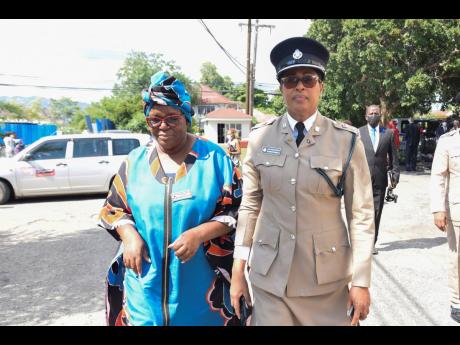Garth Rattray | Neighbourhood watches, powerful anti-crime tools
I attended the 35th Neighbourhood Watch Conference at the Kendal Camp and Conference Centre in Manchester on Saturday, November 12. The conference was extremely interesting, educational, and inspiring.
This year’s theme was ‘Neighbourhood Watch Movement… Reigniting Our Nation Through Community Partnership’. The team was led by Dr Asha Mwendo, president of the Neighbourhood Watch Movement (NHWM). She reminded us that neighbourhood watches are in partnership with the Community Safety and Security Branch (CSSB) of the Jamaica Constabulary Force (JCF), all civil groups, and private stakeholders. The sub-theme was ‘Power of effective partnership’. The goal mirrors our Vision 2030 to make ‘Jamaica, the place of choice to live, work, raise families, and do business’ …without fear.
The neighbourhood watch crime-prevention programme was initiated in 1984, under then Commissioner of Police Herman Ricketts. The first community with an official neighbourhood watch was Marl Road in St Andrew. Of the 717 registered neighbourhood watches islandwide, only 240 remain active.
In her message to the conference, Deputy Superintendent of Police (DSP) Jacqueline Dillon, national NHWM coordinator, listed some of the factors that contributed to the “high level of dormancy”. She cited the COVID-19 pandemic, an ageing population, migration, persons shying away from leadership positions, relatively crime-free communities tending to become complacent, the young people that are not attracted to the movement, and little or no resources.
SOMETHING URGENT
I can attest that the DSP is 100 per cent correct. Our community’s best attended meetings occur whenever a crisis or urgency looms, or occurs. Examples are when someone’s home is broken into and security within the community becomes a real (fleeting) fear. Other large meetings take place whenever there is something urgent that needs to be done and folks want to participate (fleetingly) in order to make it happen. The complacency factor is very real, and very dangerous. Once we drop our guard, anything can happen. Individual participation is a huge problem. The islandwide problem is that citizens want ‘someone else’ to do the things that need to be done in communities, and the executive members are sometimes chosen by default…then overworked for years.
In her message, DSP Dillon went on to list the ways that we can establish new watches and strengthen the existing ones. She stated, re-engaging the communities, engaging stakeholders, adopting new technologies (like security cameras), launching new groups, embarking on sustainable programmes/projects, and empowering watchers (crime panels) to assist in providing information on crime to the local police in a safe and confidential way.
Neighbourhood watches deter communities and the nation against crime, defend against attack, and deliver communities and the nation from attackers. Watches build communities that criminals find impossible to penetrate. Senior Superintendent of Police Lord, who deputised for Acting Commissioner of Police Charmaine Shand, among many other things, distinguished between the advantages of having active watchers as opposed to passive watchers.
The matter of failing neighbourhood watches was again highlighted and blamed, among other things, on lost or ignored alarm systems. The whistle was the alarm system chosen by NHWs, but the vuvuzela (which, in Jamaica, is actually a loud horn blown by fans at various crowd events), appears to be the more accepted choice. Failures were also blamed on folks moving out and new, unknown people moving into communities. These new people need to be actively encouraged to become part of the community. It was emphasised that efficient communities require commitment, communication, and cooperation. The unifying and crime-fighting power of communities (places where people share the same interests and not just live in proximity to one another) remains largely untapped.
FAR GREATER
It was brought to our attention that the (national security) resource of NHWs is far greater than the Jamaica Constabulary Force and the Jamaica Defence Force combined. The NHWM has extensive networking capabilities, a comprehensive (almost inexhaustible) knowledge of spaces and people, and emotional ties to individual neighbourhoods. They are also able to detect and respond to threat or crimes before the police.
Our homes are our biggest investment. It is obvious that we should want to protect our investment from crime and the socio-economic depreciation that criminality brings to communities. Even if you feel safe because you are able to hire security or have a high-tech security system, if your neighbours (near or far) become the victims of crime, you, your family and your home are automatically under threat and the value of your investment falls dramatically. In other words, we are all in this together.
The keynote speaker, Mona Sue-Ho, raised several significant points. Worthy of dissemination is that burglaries fall within the highest category of crimes committed, and they usually take place between midday and 5:59 p.m., (at a time when senior citizens are home and are able to look out for the community). Motor vehicles and vehicle parts are most stolen between midnight and 3:55 a.m. We need to harden those targets. Theft of property from vehicles usually occurs between midday to 5:59 p.m.
Active and effective neighbourhood watches are far more efficient at deterring, detecting and reacting to crime than any security company or the police. Jamaica can reduce crime if communities join or reignite the NHWM. These voluntary community organisations add to the multifactorial approach to reduce criminality. Therefore, the Government should invest significant time, effort, resources, and funds in the NHWM.
Garth A. Rattray is a medical doctor with a family practice. Send feedback to columns@gleanerjm.com and garthrattray@gmail.com

